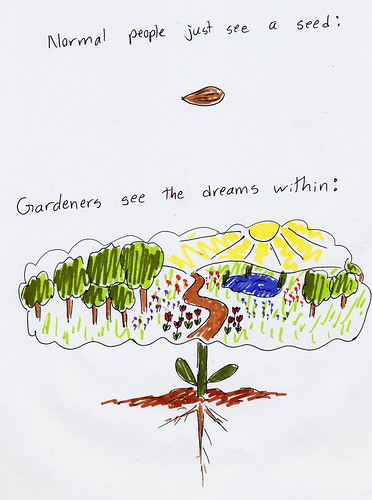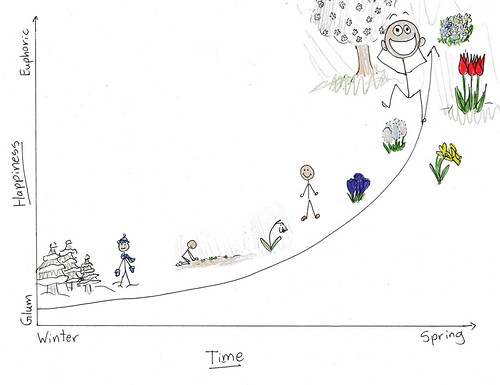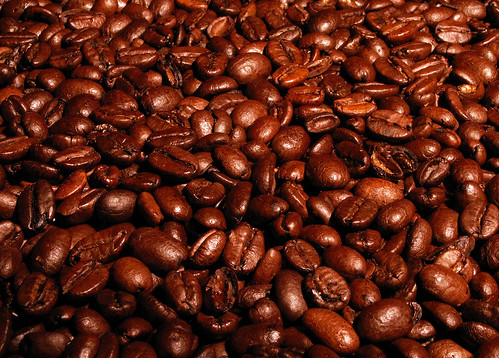I've got a serious rabbit problem in the garden. They hide in the grass, thinking I won't see them.
They nibble on my growing vegetables.
But I've got a plan.
This is war. And I'm not abiding by the Geneva convention.
(Disclaimer: No actual chocolate was harmed in the making of this blog post.)
29 April 2011
22 April 2011
18 April 2011
Sciency Answers: Wood chips and nitrogen
Nancy has a question:
Hi, Joseph! Looking for a Sciency Answer.
I keep reading that you can't use wood chips as mulch in gardens as it robs the garden of nitrogen. Is that so? How does that work? What can I do about it? Just add more fertilizer? Wood chips are such cheap and easy mulch.
Thanks,
Nancy
So nitrogen is a key building block of life, and often scarce.
In short, say yes to wood chip mulch!
Have a question? Get a sciency answer! Just e-mail me: engeizuki at gmail dot com
Hi, Joseph! Looking for a Sciency Answer.
I keep reading that you can't use wood chips as mulch in gardens as it robs the garden of nitrogen. Is that so? How does that work? What can I do about it? Just add more fertilizer? Wood chips are such cheap and easy mulch.
Thanks,
Nancy
The all importance of nitrogen
Wood chip mulches, and other high carbon, low nitrogen mulches, can suck up some of the available nitrogen in your soil. This happens because mineral nitrogen is essentially not just for plants, but for all life. Nitrogen is a key ingredient in proteins, and are a fundamental part of how life on earth works. The genes in our DNA are simply blueprints for making proteins, proteins which go on to build our entire bodies. No nitrogen, no protein, and without protein, no life. Which applies to all the soil microorganisms that want to decompose your woodchip mulch. To build their bodies and make their cool wood-digesting enzymes, they require nitrogen, specifically, mineral nitrogen, the form they can use. But mineral nitrogen is often in short supply in the soil. Everything wants it, and yet it is very easily leached away by rain water, and in the right conditions, can be converted into nitrogen gas which simply floats away in the air (forming, indeed, 78% of the air we breath). Only a few organisms, most famously the rhyzobium which form symbiotic partnerships with the roots of legumes like beans, can convert the gaseous nitrogen back into the mineral form other organisms can use.So nitrogen is a key building block of life, and often scarce.
Carbon = food
Carbon compounds, on the other hand, from sugars to starch to wood, are primarily food for soil life. When a leaf or branch falls to the ground, all sorts of bacteria and fungi quickly begin munching away on it, breaking down the carbon structure to release the energy in it to power their life. When you, the gardener, take a whole bunch of carbon, in the form of wood chip mulch, and put it on the soil, the microorganisms rejoice and start reproducing like crazy. "So much food!" they say, "Let's all have a million babies to eat it all up!" But remember, each of those little baby bacteria requires a bit of nitrogen to live. If there is a lot of nitrogen in the soil to match the amount of carbon food sources, the microrganism population skyrockets and rapidly gobble down the organic matter, releasing all sorts of nutrients and making a lovely rich soil in the process. It is this balance of nitrogen and carbon that people aim for in their compost piles to achieve extremely rapid decomposition. When nitrogen runs low
If, however, there is a shortage of nitrogen, and lots of carbon, the bacteria are limited. Without enough nitrogen, they can't reproduce to match the food supply, so any bit of loose nitrogen they find floating around gets quickly snatch up and used to make more bacterium and fungi babies. With microorganisms scavenging up any loose nitrogen they can find, it doesn't leave much for plants to use to build their proteins and chlorophyll. The nitrogen has been immobilized. It is still there, just microorganisms are busy using most of it. Over time, however, as the microorganisms finish eating up all the carbon, they run out of food, and begin to die, releasing the nitrogen in their bodies back into the soil where plants can take it up again, re-mobilizing the nitrogen.The wood chip nitrogen sponge
So when you add a layer of high carbon, low nitrogen mulch like wood chips to your garden, they act like a sponge, soaking up some of the nitrogen from your soil, and then gradually released it again. If you already have a shortage of nitrogen in your soil, this can cause a shortage for your plants , but you can solve that by simply adding a high nitrogen fertilizer, whether it be synthetic or organic fertilizer like manure, to make up the difference. And actually, adding nitrogen with carbon is better than just putting down the nitrogen fertilizer by itself. If you add concentrated nitrogen along, it will be instantly highly available to your plants, but it will also quickly leach away into the ground water, away from your plants that need it, and polluting streams and wetlands, forcing you to keep fertilizing to keep your plants growing happily. Combine that nitrogen with a lot of carbon, like wood chips, however, will keep the nitrogen around, releasing it slowly and stably over time, keeping your plants happy and minimizing polluting run-off.The bottom line
So yes, wood chips can soak up nitrogen, but that is actually kind of a good thing. And the reality is, the effect is pretty small, and you don't need to worry about it in most cases. In my vegetable beds, where I want my plants to grow very rapidly and lushly in a single season, I add a higher nitrogen layer of compost annually along with new layer of wood chip mulch to keep the nitrogen abundant. In my ornamental perennial and shrub beds, however, I pretty much just mulch with wood chips, only adding compost if the soil is particularly poor and plants aren't growing well. Most plants don't really need high fertility levels. Extra nitrogen will help they grow bigger and faster, but for many flowers, that actually just means they are more likely to fall over and require staking, and sometimes even produce more leaves at the expense of flowers. I give a few greedy flowers, like my lilies, a big dose of compost every year to really push them to decadent proportions, but other wise, wood chip mulch produces healthy, happy plants for me. In short, say yes to wood chip mulch!
Have a question? Get a sciency answer! Just e-mail me: engeizuki at gmail dot com
Labels:
compost,
fertilizer,
mulch,
nitrogen,
science,
Sciency answers,
soil
15 April 2011
Friday Gardening Cartoon: Spring euphoria!
If any of your non-gardening friends and family are wondering why you have been running around giggling and grinning the past couple weeks, simply share with them this chart demonstrating the relationship between spring and happiness for gardeners.
13 April 2011
Why does coffee wake you up and pot make you high?
I suspect you know part of the answer to why coffee and cannabis have the effect they do. Coffee has caffeine, and pot has THC. But that answer just leads to another question. Why bother to make caffeine and THC? Why do plants make so many compounds that mess with out brain chemistry? Coffee and cannabis are just the beginning. How about opium, and its various purified forms, morphene, codene and heroin (all derived from the opium poppy, Papaver somniferum) or nicotine? Or taxol or aspirin or any other of a long, long list of drugs, medicines and poisons that come from plants? Why are so many plants busily synthesizing and filling their leaves or roots or seeds with all these crazy chemicals? And why don't animals do the same thing? With all the countless species of mammals and reptiles and insects out there, you'd think we'd have a couple drugs derived from them, but whereas plants are busy little chemical factories, animals are pretty boring. Yes, there are poison snakes and spiders, but most of the poisonous animals, from poison dart frogs to monarch butterflies, don't make their own toxins, rather, they get them from their diet. Just like our bodies don't bother to synthesize our own vitamins, instead just eating the ones plants made. So why are plants the chemists of the natural world?
To start to answer that question, imagine you are sitting out in the woods somewhere, and suddenly, you look up and see a large animal that wants to eat you. A bear or velociraptor or shark or something. What do you do? Run away, climb a tree, throw a rock. Now imagine the same scenario, only you are a plant. You've got roots. You aren't running anywhere. You can't even really throw anything. All you can do is sit there, and try to not get eaten. You can't even hide under anything because you need sunlight to live. So, you start trying to make yourself toxic.
Tobacco doesn't produce nicotine in order to addict hapless smokers, it fills its leaves with the compound because it is a powerful insecticide. It just so happens that our brain chemistry is different enough from that of insects that though it is still quite toxic at high doses, at lower doses, it calms us down, and is powerfully addictive.
And what about caffeine? A lot of unrelated plants from coffee to chocolate to tea produce the chemical. What is up with that?
Well, let's give a visual with something a little closer related to the actual target of caffeine. On the left is a normal spider web. On the right, the web of spider after a little dose of caffeine.
Coffee isn't trying to wake you up. It is trying to mess with insects that might eat it, and it just so happens that your brain reacts in a little differently. Enjoy your morning cup of insecticide!
Plants aren't out there synthesizing medicine and making you high for your benefit. We just happen to have figured out how to use these poisons in small doses to achieve effects that we want, like numbing pain or killing cancerous cells.
The reality that the powerful chemicals we derive from plants are designed primarily for chemical warfare indicates the need to take “natural” herbal supplements and the like with a bit of trepidation. A lot of the time nature isn't so concerned with healing as it is with killing.
Labels:
cannabis,
coffee,
drugs,
natural medicine,
science
11 April 2011
Dwarf irises for early spring euphoria.
I adore the little dwarf bulbous irises -- I. reticulata, various related species and hybrids. They flower super early, mine have been blooming for about a month now, and unlike, say, snowdrops, which one only loves because they are early (I mean, really, if snowdrops bloomed in June, no one would have ever heard of them) these little guys have some of the most incredibly beautiful, intricate, fragrant flowers I know of.
I planted the hybrid 'George' just three years ago, and already the original few bulbs have begun multiplying into generous clumps. This past fall I added 'Harmony' (rich blue) "Katherine Hodgekins' (pale blue) and I. danfordiea (yellow) all of which went together to create a cheerful and intensely fragrant bouquet for my mother-in-law's birthday this past weekend
Smudge, our cat, liked it too.
I've heard from other people that dwarf irises sometimes fail to rebloom in subsequent years, but I've never had that be a problem. I think the key is good drainage and full sun while their foliage is up in the spring. But even if they didn't rebloom for me, I wouldn't be without them. They are beautiful, cheap, and easy. What more could you ask for?
I planted the hybrid 'George' just three years ago, and already the original few bulbs have begun multiplying into generous clumps. This past fall I added 'Harmony' (rich blue) "Katherine Hodgekins' (pale blue) and I. danfordiea (yellow) all of which went together to create a cheerful and intensely fragrant bouquet for my mother-in-law's birthday this past weekend
Smudge, our cat, liked it too.
I've heard from other people that dwarf irises sometimes fail to rebloom in subsequent years, but I've never had that be a problem. I think the key is good drainage and full sun while their foliage is up in the spring. But even if they didn't rebloom for me, I wouldn't be without them. They are beautiful, cheap, and easy. What more could you ask for?
Labels:
cut flowers,
iris reticulata,
irises,
spring
08 April 2011
Friday Garden Cartoon: Seed dreams

Sorry for another rerun... I had a new one all drawn, but didn't get it scanned in time! Next week for sure.
06 April 2011
I still don't quite believe it
I've been growing plants from seed since before I started kindergarten
It seemed like magic to me then, and it still does today.
It seemed like magic to me then, and it still does today.
Labels:
growing from seed
04 April 2011
Sciency Answers: Fertilizers: Organic, natural, conventional or... what?
Dave sent me a question -- asking about my thoughts on some specific natural fertilizers that had been recommended to him. So, today's sciency answer is a quick run down on different types of fertilizers.
There are tons of differents kinds of fertilizers -- conventional liquids and powders, and a seemingly endless array of different organic options.
The first thing to say is:
Your plants don't care.
A plant's roots absorb certain specific compounds from the soil. And the phosphorus they get from an organic fertilizer is identical in every respect to the phosphorus they get from a synthetic fertilizer.
Which isn't to say what you choose doesn't matter. How a fertilizer is produced has an environmental impact. Synthetic nitrogen fertilizer is produced by the Haver process, an effective but energy intensive method to convert the nitrogen gas in the atmosphere into forms of nitrogen plants can use. Phosphorus for conventional fertilizers are actually mined -- and minable phosphorous in the earth is a non-renewable resource, and at our current usage rates, we're predicted to run out in about 30 years (A nice article on the topic from Slate: http://www.slate.com/id/2258112/entry/2258053/). In contrast, organic fertilizers like compost or manure let us recycle the nutrients we have. Though it is worth mentioning that shipping some sort of special organic fertilizers from across the country isn't going to be exactly carbon neutral either. Like very thing else, local is the best here.
The other big difference between different sorts of fertilizer is how concentrated and how "fast acting" they are. Highly concentrated fertilizers, like the genetic bag of 20-20-20 synthetic fertilizer OR the highly purified equivalent organic fertilizer bags, usually break down quickly in the soil releasing lots of nutrients in a rapid burst. This gives a satisfyingly rapid response from your plants, but also makes it much more likely you'll over fertilizer, potentially harming beneficial soil biology, and much increasing the risk of polluting fertilizer run off into ground water and wet lands. Most less concentrated fertilizers, like compost, don't release nutrients right away. Rather, soil microbes have to further decompose the compost to actually break down the nutrients in it to the forms plants can uptake. The result is a much slower response from the plant, with fertility that stays more constant, and much less chances for overfertilizing and polluting run-off.
The final benefit of using things like compost as a source of fertility is that they provides food for a whole host of soil organisms, creating a healthier, richer soil that retains water better, promotes healthy root growth, and allows plants to better utilize the nutrients that are already there.
So, in short: Highly concentrated, fast-acting fertilizers (organic OR synthetic) can give you impressive, quick results, but don't do anything for your soil, and can easily lead to polluting run-off. Less concentrated, slow-release fertilizers, like compost, take time to show results, but produce healthier soils that can grow great plants consistently over time. So in general, I am skeptical of any special fertilizer. Organic or not, the basic chemicals of fertilizers are all the same, and anything that will show results over night is probably not great for your garden in the long term. In the end, the basic standards, just local compost and mulch, are the simpliest, easiest, and best.
There are tons of differents kinds of fertilizers -- conventional liquids and powders, and a seemingly endless array of different organic options.
The first thing to say is:
Your plants don't care.
A plant's roots absorb certain specific compounds from the soil. And the phosphorus they get from an organic fertilizer is identical in every respect to the phosphorus they get from a synthetic fertilizer.
Which isn't to say what you choose doesn't matter. How a fertilizer is produced has an environmental impact. Synthetic nitrogen fertilizer is produced by the Haver process, an effective but energy intensive method to convert the nitrogen gas in the atmosphere into forms of nitrogen plants can use. Phosphorus for conventional fertilizers are actually mined -- and minable phosphorous in the earth is a non-renewable resource, and at our current usage rates, we're predicted to run out in about 30 years (A nice article on the topic from Slate: http://www.slate.com/id/2258112/entry/2258053/). In contrast, organic fertilizers like compost or manure let us recycle the nutrients we have. Though it is worth mentioning that shipping some sort of special organic fertilizers from across the country isn't going to be exactly carbon neutral either. Like very thing else, local is the best here.
The other big difference between different sorts of fertilizer is how concentrated and how "fast acting" they are. Highly concentrated fertilizers, like the genetic bag of 20-20-20 synthetic fertilizer OR the highly purified equivalent organic fertilizer bags, usually break down quickly in the soil releasing lots of nutrients in a rapid burst. This gives a satisfyingly rapid response from your plants, but also makes it much more likely you'll over fertilizer, potentially harming beneficial soil biology, and much increasing the risk of polluting fertilizer run off into ground water and wet lands. Most less concentrated fertilizers, like compost, don't release nutrients right away. Rather, soil microbes have to further decompose the compost to actually break down the nutrients in it to the forms plants can uptake. The result is a much slower response from the plant, with fertility that stays more constant, and much less chances for overfertilizing and polluting run-off.
The final benefit of using things like compost as a source of fertility is that they provides food for a whole host of soil organisms, creating a healthier, richer soil that retains water better, promotes healthy root growth, and allows plants to better utilize the nutrients that are already there.
So, in short: Highly concentrated, fast-acting fertilizers (organic OR synthetic) can give you impressive, quick results, but don't do anything for your soil, and can easily lead to polluting run-off. Less concentrated, slow-release fertilizers, like compost, take time to show results, but produce healthier soils that can grow great plants consistently over time. So in general, I am skeptical of any special fertilizer. Organic or not, the basic chemicals of fertilizers are all the same, and anything that will show results over night is probably not great for your garden in the long term. In the end, the basic standards, just local compost and mulch, are the simpliest, easiest, and best.
Labels:
compost,
fertilizer,
science,
Sciency answers,
soil
Subscribe to:
Comments (Atom)














